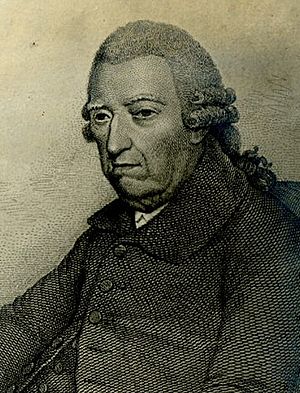Francis Maseres facts for kids
Quick facts for kids
Francis Maseres
|
|
|---|---|

Francis Maseres
|
|
| Born | December 15, 1731 |
| Died | May 19, 1824 (aged 92) |
| Occupation | lawyer, attorney general, judge, mathematician, historian |
Francis Maseres (born December 15, 1731 – died May 19, 1824) was an English lawyer. He is known for his important roles as the top lawyer (called an attorney general) for the Province of Quebec. This was a British colony in North America. He was also a judge, a mathematician, and a historian. He was a member of the important Royal Society and held a special financial role called a cursitor baron of the exchequer.
Contents
Francis Maseres's Life Story
Early Life and Education
Francis Maseres was born in London, England, on December 15, 1731. His parents were Magdalene du Pratt du Clareau and Peter Abraham Maseres, who was a doctor. The Maseres family were French Protestants. They had left France in 1685 because of a law called the Edict of Nantes. This law took away the rights of Protestants in France. Francis could speak French very well. He also had a brother named Peter.
Francis went to school in Kingston-upon-Thames. After that, he studied at Clare College, Cambridge. He earned two degrees there: a Bachelor of Arts in 1752 and a Master of Arts in 1755. He then began studying law in 1750 at a place called the Inner Temple. He officially became a lawyer in 1758.
Working in Quebec
On March 4, 1766, Francis Maseres was chosen to be the attorney general for the new British Province of Quebec. This area used to be called French Canada. Britain had taken control of it in 1760. France officially gave it to Britain with the Treaty of Paris in 1763.
Francis Maseres started his job on September 26, 1766. He worked as the attorney general until the autumn of 1769. In March 1768, the government, led by Governor Carleton, asked him to write a report. This report was about how to improve the laws in Quebec. He gave his report in February 1769.
Return to London and Public Service
After his time in Quebec, Francis Maseres went back to London. He continued to be very interested in what was happening in the American colonies. In 1770, he wrote an essay. In it, he suggested that the colonies should have representatives in the British Parliament as soon as possible.
In 1771, he was chosen to be a member of the Royal Society of London. This is a very old and respected group for scientists. In August 1773, he became a cursitor baron of the exchequer. This was a special job in the British financial system. In 1780, he was chosen to be a senior judge in London's sheriff’s court.
He also got involved in a movement to change the laws of Quebec. This movement became very active after the American War of Independence ended in 1783. It led to the British Parliament passing the Constitutional Act in 1791. This act changed how Quebec was governed. Francis Maseres also supported Pierre du Calvet. Du Calvet wanted to take Governor Frederick Haldimand to court. He believed the governor had broken the British constitution.
Interest in Mathematics
Francis Maseres was also very interested in mathematics. However, he had some old-fashioned ideas about it. In 1758, he wrote a book called Dissertation on the use of the negative sign in algebra. In this book, he argued that negative numbers were only useful for showing subtraction. He did not think they were real numbers on their own.
Maseres helped pay for many math books to be published. For example, he supported John Hellins's large edition of a math book by Maria Gaetana Agnesi. This book was very helpful for British mathematicians. But Maseres also had a negative effect on math. He criticized new math ideas like calculus.
Later Life and Death
Francis Maseres never married. He passed away at his country home in Reigate on May 19, 1824. He was 93 years old.
Images for kids
-
The title page of A View of the English Constitution (1st ed., 1781). This was a translation by Maseres of part of Montesquieu's De l'esprit des loix (The Spirit of the Laws).
 | Frances Mary Albrier |
 | Whitney Young |
 | Muhammad Ali |



